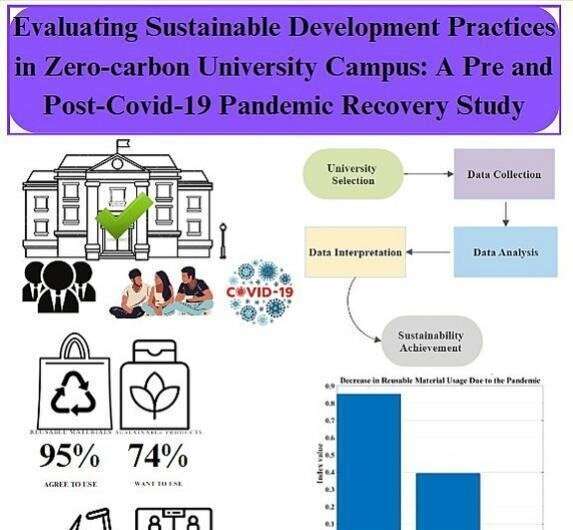This article has been reviewed according to Science X's editorial process and policies. Editors have highlighted the following attributes while ensuring the content's credibility:
fact-checked
peer-reviewed publication
trusted source
proofread
Delivering practical guidelines and insights for creating a net-zero carbon campus

A new paper published in Science of The Total Environment features new information to help universities measure the ability for sustainable behavioral change among staff and students on a university campus, which could help to create the foundations for net-zero carbon campuses.
The study, led by Bashar Shboul and Professor Lenny Koh from the Sheffield University Management School, used a "living lab" project framework and university-wide survey to find out more about attitudes towards the different methods of making campuses more sustainable, and how those attitudes differed before and after the COVID–19 pandemic.
The findings provide valuable insights for sustainability researchers and other university campuses, offering practical guidelines for creating a net zero-carbon campus and how to engage staff and students on making changes for the benefit of the planet.
The study found that campus users were supportive of using reusable materials, paying more for sustainable products, seeking alternative transportation for short trips, and prioritizing online conferences for sustainability. However, the pandemic did change some opinions, for example people were less inclined to use reusable materials.
Overall, the survey and subsequent data analysis showed that there was a high likelihood of campus users adopting sustainable behaviors on campus. It also showed that the commitment to sustainability was higher in "daily life" and research activities in comparison with teaching and learning activities.
Other findings included the diverse range of needs on a university campus, which means inclusive planning is important when planning sustainability-focused measures.
Ultimately, the findings of this study will help guide decision-makers in implementing new low-carbon initiatives across campuses, in everything from the heating in offices to reusing cups and plates, which could help to decarbonize higher education spaces and make campuses greener places to live and work.
More information: Bashar Shboul et al, Evaluating sustainable development practices in a zero‑carbon university campus: A pre and post-COVID-19 pandemic recovery study, Science of The Total Environment (2023). DOI: 10.1016/j.scitotenv.2023.165178
Journal information: Science of the Total Environment
Provided by University of Sheffield


















